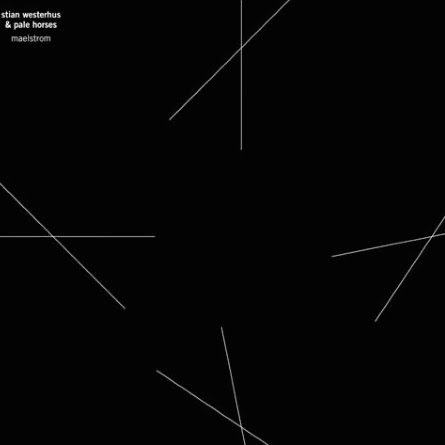Stian Westerhus is a Norwegian avant-jazz guitarist, and for most ears I’m guessing, the epitome of a "challenging" player – my only previous encounter with him was via the disquieting soundscapes of his 2010 album Pitch Black Star Spangled, and <a href "https://www.youtube.com/watch?v=fm5a9t8PcdU "target="out"> as this clip from a BBC Radio 3 session shows, he manages to do everything with a guitar except play it conventionally. So to say that this new album with his newly-formed band Pale Horses is a change in direction is a bit of an understatement.
Having decided to use his improvisational style within more traditional melodic structures, Westerhus has produced an album that re-invents 21st century guitar-based power balladry, and is often nothing short of astonishing. Not only that, but he’s also stepped up to the mic and revealed himself to be a singer of both subtlety and range, genuinely inhabiting the songs rather than just emoting emptily over them. In fact, Maelstrom is just as challenging as his previous albums, but in the way that it demands complete engagement from the listener rather than because of its sonic palette.
That’s not to say there’s nothing interesting for the ear to latch onto – most of the songs here sit in a sound bath of cut-ups and loops, glitchy sampletronica that shifts restlessly like the unquiet ghosts of dead media, while Westerhus’ guitar can still produce mesmerising flashes of lightening. But it’s the emotional pull of the songs, an appeal to the heart as much as the head, that’s the real focus of the album.
So yes, power ballads. There’s no getting away from the fact that Radiohead are the most obvious precursor to this type of deconstructed-rock-band-plus-oblique-passion approach, and Westerhus certainly comes close to emulating Thom Yorke’s vocal delivery in places. Goddammit, there’s even hints of U2 and Coldplay in here (albeit the bits you secretly like when no one’s looking). But Westerhus and band make the format their own by treating the songs as linear progressions rather than traditional verse/chorus arrangements, letting them go where they need to go in a manner that recalls later period Talk Talk.
Opening track ‘Don’t Say That You Care’ is a good illustration of this. Over disembodied woodwind, Westerhus starts in torch singer mode, his voice similar in tone to the world-weary richness of The Blue Nile’s Paul Buchanan. But as the song gradually grows in volume and intensity, the drums clattering and rumbling with increasing force, Westerhus starts to climb to a pitch of near-hysteria that recalls Billy Mackenzie in full flight, repeating the title over and over again against a barrage of majestic guitar strafing until the song suddenly cuts dead. Similarly, ‘Nights And Sleepless Days’ begins against a background of misfiring electronica, Westerhus deploying a serene falsetto this time, before a minor key riff introduces a note of unease. There’s another big build that finally gives way to glorious sheets of sunburst guitar scree tumbling down a vast mountainside into darkness below, the final section of the song consisting of just sombre piano chords and a resigned, sepulchral vocal.
‘Bed On Fire’ follows this pattern, the machine whirrings of the intro mangling Westerhus’ voice, initially resisting meaningful communication, before resolving into another disconsolate hymn. Then sure enough, the song begins to rise as drums and a nagging riff emerge from the flames, the guitar gradually dissolving into Fripp-esque liquescence before a coda of eerie female choir. In contrast, ‘On And On’ is the most conventionally structured song on the album, its mid-paced, menacing groove recalling Queens Of The Stone Age (increasingly a key touchstone – no pun intended – for sophisticated modern rock), Westerhus sounding like a dead ringer for Josh Homme. With its shimmering quicksilver guitars and big gated drums a la Collins, there’s a parallel universe somewhere in which this is a hit record.
‘Times Like These’ takes us back to the tech age slow burn of the opening tracks, its rough assembly of woodwind, bells, harps and strings suggesting a confluence with These New Puritans. "The future’s rolling down the hill – what have we done for it?" intones Westerhus, as the song mutates into a dense, gothic swagger. ‘Chasing Hills’ really hits the Radiohead button, a slightly creepy confessional that could easily have been a centrepiece track on Amnesiac beside the likes of ‘Pyramid Song’. When it kicks in, the guitar is like a hulking mechanical beast of burden pulling itself through a portent-ridden landscape. Finally, we get to ‘Maelstrom’ itself, Westerhus standing on the deck of a becalmed vessel in the eye of a storm, guitars creaking like rigging in the wind as the ship’s bells ring out. As a vortex of voices and drums starts to churn, this is the album at its most avant-garde, the instrumentation and vocal recalling the Scott Walker of Tilt. The final crescendo breaks with Westerhus’s angelic voice riding the crest of an advancing black wall of the four elements before the storm blows itself out for good.
This is an expansive, Romantic album that creates the feeling that something extraordinary could happen at any moment. It also unselfconsciously takes itself seriously – nothing is in quotation marks here, which saves it from those occasions when it threatens to become overblown. By coming out of leftfield, Stian Westerhus & Pale Horses have created what will surely be one of this year’s most artistically impressive and satisfying contemporary rock albums.


